- Home
- Neal Asher
Dark Intelligence Page 4
Dark Intelligence Read online
Page 4
“What do you know about an AI called Penny Royal?”
The moment I said the words, my encounter with Sheil Glasser slid somewhere into the back of my mind. A footnote, a brief sojourn of no consequence. My past loomed around me, ready to sweep recent pleasures aside and determine my future. A longer delay ensued before Bob replied succinctly, “A search should give you everything permissible. I suggest you get up to date.”
Did Bob know my history, and had he guessed my intentions? I wanted to ask more, but decided I really needed more data before I set out on my course. It was one that seemed almost inevitable—a quest for vengeance. I needed to work out not just how to kill a rogue AI, but one that had long been on a Polity blacklist. I sat back, hand straying to the holographic controls then dropping away again. Further memories nagged at me now with hints of horror. And I knew, deep in my gut, that facing them was going to be no easy task …
THE WAR: PANARCHIA
I woke in complete darkness, suspended upside down, my body feeling as if it had been fed through a rolling mill. My mouth was dry but the stuff that came out of my suit spigot tasted of piss. My face was sore and painful, probably from a flash-burn my visor hadn’t been enough to prevent. I didn’t want to move, because I knew I must be feeling just the edge of my true injuries. That I was alive at all—after standing on the edge of a multiple CTD strike in the megaton range—stretched credibility.
I realized I was swaying and that I could hear sounds of movement, even though all my suit electronics appeared burned out. What had happened? Well, a Polity destroyer had come in and bombed Berners’ division to oblivion … I had to leave that one alone—could make no sense of it. The blast wave and firestorm had picked me up and now I was … hanging upside down. Maybe I’d been thrown into a tree? No, because there weren’t any trees here on Panarchia. Well, at least not in our region.
Something thumped against my ankle, accompanied by a high-pitched whining, and after a moment that ankle felt cold. Next, the whining started on my other ankle and was followed by a sharp pain; I jerked, then something clamped around my neck, stretching me while the whining continued down one leg. I felt my suit falling away and realized someone was cutting me out of it. The material and armour were stripped in turn from my legs, hips and torso and roughly pulled from my arms. Then, with blurred vision, I watched a line of light scribing down my visor. The whining rattled cicada-like in my eardrums, continued over my scalp and moved down behind—then my helmet split in two and went clattering to the ground. I blinked to restore my vision, then wished I hadn’t.
A second-child close up is no pleasant sight, and this one was a particularly ugly example of the prador species. Its carapace was a dirty custard yellow, heavily scarred and shell-welded, with those marks fading to an interesting mixture of green and purple. One of its palp eyes was missing and had been replaced by a motion detector. This was riveted to its visual turret beside the other palp, which looked burned and blind. The crescent of eyes below, actually on the front of the turret, were clean ruby behind a protective eye shield. This it shifted up away on its turret with one crusty claw lined with armour glass blades, before scuttling back from me. It then whipped its squashed pear of a body around on just five crablike legs.
Now focusing beyond it, I saw the first-child. It was twice the size of its smaller relative, coloured purple and yellow and had all its parts. These were complemented with attachment points for its weapons, which were stacked on the ground nearby, being worked over by another second-child. I scanned further and spotted three more second-children, various mounds of equipment and a row of four naked human corpses. I didn’t recognize any of them, since they were all burned red raw. Turning my head slightly, I found I was hanging from a pole. This extended from a partially dismantled implant tank, with its other end attached to another pole imbedded in the rock ground. Further along the horizontal pole hung two other people, who were still alive. The one right next to me was Gideon, the one further along I didn’t recognize, because even though alive he didn’t have a face.
I knew how this would go now and, by the expression on his face, so did Gideon. We would be interrogated over a long period and, even if we answered all the questions they posed, we would still be tortured to death. We would probably see bits of our bodies being eaten by the creatures before us. But, if we were lucky, one of them might get over-excited during the process and kill us quickly.
The second-child swiftly moved to one side, obviously cringing as the first-child now advanced. This creature loomed over us. It inspected me closely, prodded with a claw like an industrial chisel, which knocked the wind out of me. Seemingly satisfied it moved on to Gideon and gave him the same treatment. Obviously not as damaged as I felt, Gideon swung up from the waist and made a grab for one of its eyes, trying to inflict at least some injury. The prador’s claw came up fast, snipped and Gideon yelled, blood squirting from his wrist as his hand thudded to the ground. The first-child moved on to the last in the row and began prodding, eliciting a horrible keening noise. Meanwhile the ugly second-child moved in behind, rose on its back legs and caught Gideon’s arms in its claws as it extended manipulator hands from its underside. Something went snap and Gideon screamed again as it stepped back, a metal band clamped into the forearm above his damaged wrist. They didn’t want any of us bleeding to death, not yet.
The first-child continued prodding the faceless soldier at the end, setting him swinging. Then, obviously coming to a decision, it snipped twice and severed both his ankles, catching him as he fell then tossing him behind. A few bubbling clicks of prador speech ensued and all the second-children closed in. His shrieks didn’t last long as they were eager for this morsel. In a matter of seconds, he was in pieces and disappearing with a gristly crunching into prador mandibles.
The first-child moved back to study Gideon and me, then it bubbled and a human voice issued from a translator, shell-welded below its mandibles.
“Father comes,” it stated. “Testing is required.”
“Fuck your legless father and fuck you!” Gideon shouted.
He was a brave man, I knew that, but I also knew he was trying to hurry his own end.
The pole jerked and I glanced across to see a second-child, still chewing merrily, sliding it off the tank. We crashed down and the next thing I knew, a second-child had hold of me and was dragging me across the rock. I didn’t fight like Gideon, but the result was the same. We both ended up face down on the ground, with metal clamps holding down our legs and arms. Having been suspended for so long this was a relief to me, but I couldn’t understand why it had been done.
An hour passed, maybe more, and I’d just managed to gain enough movement in my neck to watch events around me. The prador did not touch us again. One of the second-children tried snacking on a corpse and had its carapace cracked open for its trouble. It crouched off to one side, hissing and bubbling, leaking green blood. Such was simple prador discipline and it wasn’t enough to kill it.
Finally something approached across the rockscape—a rough prador grav-effect transport resembling a short, fat cargo ship. A wind blew across us, carrying ash and a spray of water from the surrounding pools, and the ship’s shadow fell over us as it slowed and settled. The deep thrumming of its engines vibrated through the ground for a long time, then slowly died away. Next, a huge ramp hinged down, bringing with it a cold gust of sea-smell and putrefaction. Two first-children came scuttling down carrying two heavy, oddly shaped metal frames. The father followed, hovering on grav-engines. The creature was massive, with a fifteen-foot carapace, and prosthetic claws fashioned of brassy metal extended towards the front of its body. Two remaining legs on one side were obviously paralysed and on the point of dropping off. I noted four hexagonal boxes, shell-welded along below its mandibles, one of which was also prosthetic. I wondered what the hell they were. Speculation soon fled my mind when I saw what came down the ramp next.
Four human beings walked down: three men and one w
oman. They were big and heavily muscled, their skin mottled with strange blue rings as if they’d suffered some sort of alien pox. All three were naked except for weapons harnesses and they were heavily armed. They also carried assorted items of equipment and, when I saw that some of it was Polity medical tech, I felt a horrible intimation of what might happen next.
“Fucking traitors,” Gideon managed, but his voice was hoarse and weak now and probably intended for my ears only.
The prador father slid in to loom over us, so close I could feel the effect of his grav-engines alternately trying to shove me into the ground and peel me from it. He settled then, his first-children inserting the frames under each side of his body. Thus supported above the ground, he was all nicely positioned to watch the show.
The four humans, who until then had been standing unnaturally still, now jerked into motion. They headed straight for Gideon and gathered round him. He kept swearing, even as they hooked him up to a combined plasma and drug feed, used a Polity diagnosticer on him and injected various drugs. He fell silent and limp when they placed nerve blockers on several parts of his spine. Now I was truly puzzled. They’d numbed him—so preventing him from feeling any pain.
Then they started cutting.
It was quick, efficient, as if a practised butcher was preparing meat. They peeled first skin, then flesh from the back of his head and neck, then used bone saws to cut his skull, then levered off a section to expose his brain. They cut away sections of his neck vertebrae and inserted thin but flexible blades and made incisions into his lower back. Various fluids were now injected at some points. I heard an acid hissing and watched Gideon’s legs shivering. Next came a sucking crunch and the blue woman held up something globular and bloody, trailing a tail, then tossed it to one side. As it hit the ground, I realized they’d just extracted his brain and a large portion of his spinal cord. It made no sense. They’d killed him under anaesthetic. Surely they d discarded the one part of him that might be useful to them?
Meanwhile, the prador father, just like a film-goer tucking into the popcorn, was chomping down chunks of human flesh—fed to him by one of the second-children. I wondered if I’d died and been consigned to some thoroughly insane adjunct of Hell. Then I turned back to Gideon and saw that they hadn’t finished with him.
A ribbed glassy tube went down into his neck where his spinal cord had been. Before it was all the way in, they attached a squat metal cylinder to the end, which immediately began to extend sharp metal spines. This they pushed inside his skull. The next stage was to put back the skull they’d removed, using a Polity bone-welder to fix it, then a cell-welder to close up his opened flesh. I just stared, horrified and baffled.
Bubbling clicks issued from the father. I looked at the monster and saw one of the first-children present him with another hexagonal item, like the ones bonded to his shell, which he accepted while munching on his grisly snacks. When I looked back at Gideon, one of the men was pulling out the metal staples that had held him to the stone—an almost impossible feat of strength. I wondered what they would do with his body next, even as the woman came over to me with the plasma feed and diagnosticer. Maybe that thing they’d inserted imparted some special flavour beloved of the father here? I watched the woman as she squatted beside me, hoping to die as easily as Gideon, then returned my attention to the man himself.
Gideon jerked, jerked again, then abruptly heaved himself up onto his hands and knees. Or, rather, knees and one hand. I realized then what I’d been stubbornly refusing to see up to this point. They’d implanted control hardware in him. But surely his body couldn’t survive such trauma? Then I looked at the woman as she hooked up my plasma feed, and wondered.
Gideon stood up, his pose quite unnatural, and took a couple of shuffling steps. Glancing at the prador father I saw he still held that hexagonal device—like the four attached to his carapace—and made the connection with the four humans here. My ex-comrade heaved a breath before taking a lurching step and falling flat on his face. The four blue-skinned humans and all the prador, except for the father, now froze. Gideon jerked and spasmed on the ground for a little while, then shiny metal spikes protruded from his skull for a moment before retracting. Next, with a crunch, his skull popped open, breaking its bone welds, and the device inside shot out. It was still attached to its glassy tube, like some strange sprouting thistle. The prador father discarded the hexagonal object, and in one huge prosthetic claw snatched up the second-child that had been feeding him, and chopped it in half. The two halves hit the ground running but, only having legs along one side, could only manage a perverse circular dance which spread gore over the rock.
I remembered Gideon trying to remote-start a damaged mosquito gun. He tossed aside the control unit before bawling out the person responsible for the damage. This was similar, but thoroughly, grotesquely, magnified.
About me, the humans were in motion again. They injected me, which hurt, but the result was an artificial euphoria and comforting indifference. Any moment now the nerve blockers would go on and it would all be over. It didn’t matter—nothing mattered any more. But there were no nerve blockers, and I screamed when they cut into the back of my neck and returned rapidly to hard reality. I saw the thing they brought over. It looked like a chrome spider with a cylindrical body—I felt it digging in and screamed some more.
Whether it was unconsciousness or the loss of my ability to act in any way that stopped me screaming, I don’t know. All I do know is that the blackness was welcome.
3
SPEAR
It didn’t take me long to familiarize myself with modern methods of using the AI net, despite my thinking still lacking clarity. On occasions my mind did function as it should and, in one of those moments, I created a sub-AI informational bloodhound and dispatched it on a search. While I awaited its results, I turned my attention to more prosaic tasks.
With feelings of déjà vu, of familiarity, recurring with annoying regularity, I skimmed reports on the after-effects of resurrection. I discovered that some people did experience this, along with a huge range of other mental problems. But linking these conditions to a specific cause was apparently a grey area. They might stem from the shock of dying, the shock of finding oneself alive or from feeling alienated by seemingly sudden transitions between places and times. Or death and resurrection might not be the cause at all. Considering what Sylac had told me, I surmised that my admittedly small problem might be due to the damage to my memplant and its subsequent forensic reconstruction. I suspected the feelings would fade with time and turned to other matters.
It took me just a few minutes to find out that anyone I’d cared about was either dead or untraceable. There were a few acquaintances I could contact but no one I could call friend—most of them had died on Panarchia. My mother died after the war and my father chose to upload to a portion of the Soulbank where people could live virtual lives. My elder brother had seemingly discovered a need for suicidal pursuits early—at the age of a hundred-and-fifty—and disappeared on a world called Spatterjay. After spending a fascinating time studying the history and biology of Spatterjay—the evil that Jay Hoop and his band of pirates had committed there, the viral immortality imparted by the leech, and the fascinating and dangerous Old Captains—I turned to the data my virtual bloodhound had been accruing. All other research felt like a mere duty in comparison.
Penny Royal.
It seemed, that even after more than a hundred years, the murderous AI was still around.
Penny Royal had controlled the destroyer that bombed Panarchia, murdering over eight thousand troops with “friendly” fire. Directly after that event, the AI went black. To the general grunt this meant it went off the radar and was never heard from again, but if you worked in bio-espionage it meant something else entirely. The AIs couldn’t keep knowledge of Penny Royal’s actions secret, because you might come across their results. I soon learned that when an AI went black, this aptly described the colour of its soul, were su
ch a thing to exist. When something as powerful as Penny Royal turns into a sociopath, the results can be … unimaginable.
After Panarchia, I remember the first time I saw one of the rogue AI’s victims. There had been a battle on one of Rhoder’s moons. Afterwards, I was called in to examine a bunker on our base’s perimeter. The bunker contained a particle cannon, stripped of computerized controls as EM and computer viral warfare had been fierce at that time. For a while there, humans had been without any AI assistance at all.
The cannon sat in an armoured pillbox, its polished square-section barrel protruding through a full-sphere traversal port in the domed ceiling. The cannon’s lower section looked like an old Earth weapon from one of the World Wars fused with an array of chain-glass-sealed ultra-capacitors. Except, when I arrived, the gunner himself had become a disturbing part of the mix.
Although gun and gunner had been amalgamated, the gunner was still alive. His head had been linked to the gun’s targeting laser and optical sights, and was only connected to his body via extended artificial electrochemical nerves and blood vessels. His hands and feet had been directly spliced into the relay board that controlled the thing’s hydraulics. His heart could still supply oxygenated blood but, because his liver, kidneys and other organs were missing, he was dying. He died when we tried to remove him but, via a voice synthesizer, he managed to describe the black-spined AI monstrosity that had remade him.
I never made the connection then. Later, I read a report of a similar incident on another world and it was filed under the heading Rogue or Black AIs, with a subheading of Penny Royal. That report further revealed that it was Penny Royal who had incinerated my friends and comrades on Panarchia. The AI had not disappeared into the void, and had not suicided as so many such rogue AIs did. I could still find it, and I could kill it. The need for payback back then was a driving force—a feeling I only resisted because, well, I had a war to fight. And now I didn’t want to resist it at all. Not just because Penny Royal wiped out Berners’ division, but because of what had happened to me afterwards. I blamed Penny Royal directly for my fate at the claws of the prador, for that spider thrall and for all I’d lost.

 The Bosch: A Novella (Polity Universe)
The Bosch: A Novella (Polity Universe)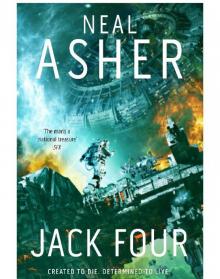 Jack Four
Jack Four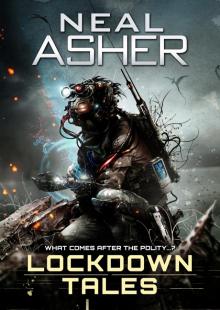 Lockdown Tales
Lockdown Tales The Warship
The Warship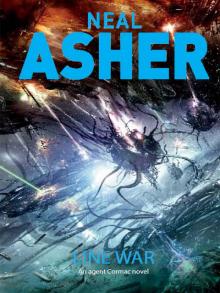 Line War
Line War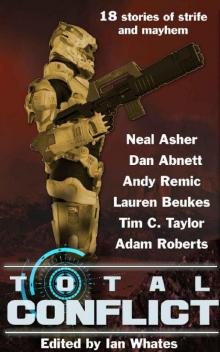 Total Conflict
Total Conflict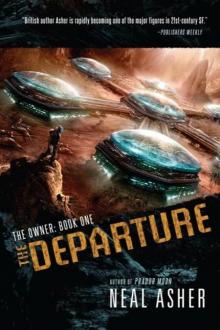 The Departure
The Departure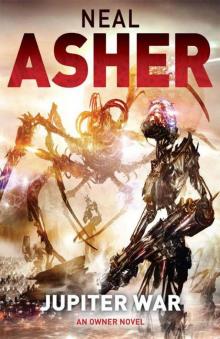 Owner 03 - Jupiter War
Owner 03 - Jupiter War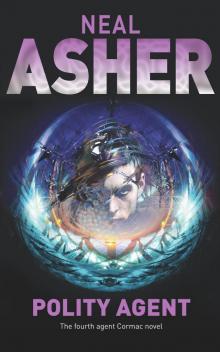 Polity Agent
Polity Agent Prador Moon
Prador Moon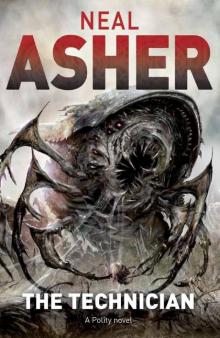 The Technician
The Technician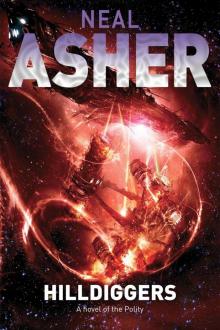 Hilldiggers
Hilldiggers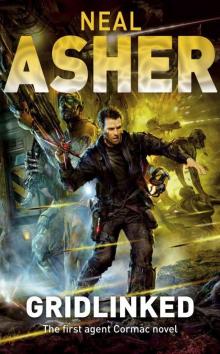 Gridlinked
Gridlinked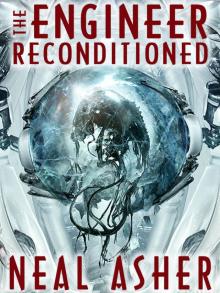 The Engineer ReConditioned
The Engineer ReConditioned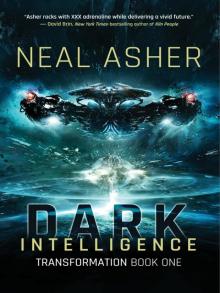 Dark Intelligence
Dark Intelligence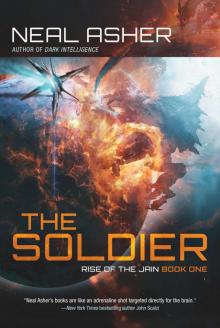 The Soldier: Rise of the Jain, Book One
The Soldier: Rise of the Jain, Book One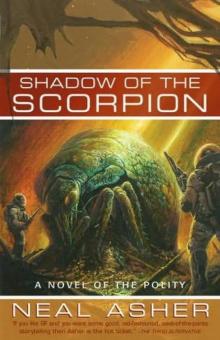 Shadow of the Scorpion p-2
Shadow of the Scorpion p-2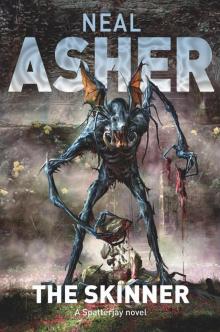 The Skinner
The Skinner The Soldier
The Soldier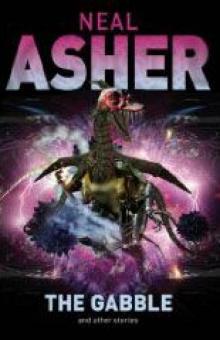 The Gabble p-13
The Gabble p-13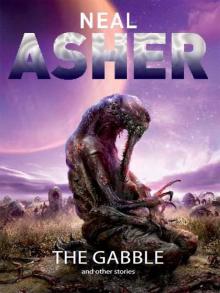 The Gabble and Other Stories
The Gabble and Other Stories The Parasite
The Parasite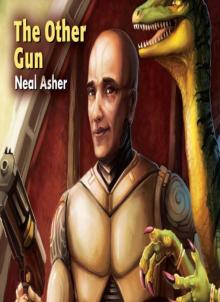 The Other Gun
The Other Gun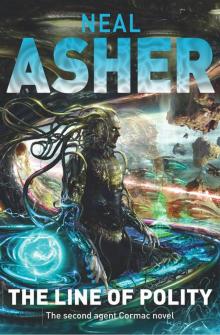 The Line of Polity
The Line of Polity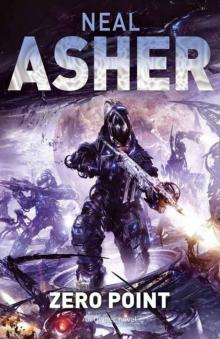 Zero Point (Owner Trilogy 2)
Zero Point (Owner Trilogy 2)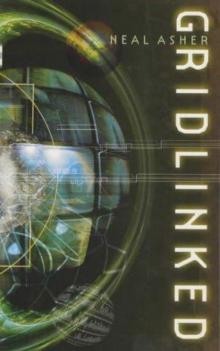 Gridlinked ac-1
Gridlinked ac-1 Prador Moon p-1
Prador Moon p-1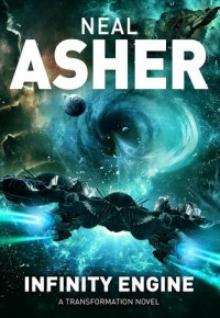 Infinity Engine
Infinity Engine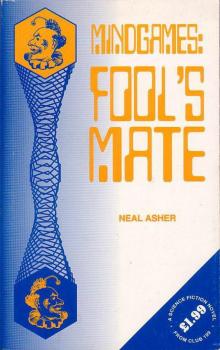 Mindgames: Fool's Mate
Mindgames: Fool's Mate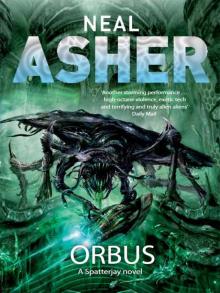 Orbus
Orbus Africa Zero
Africa Zero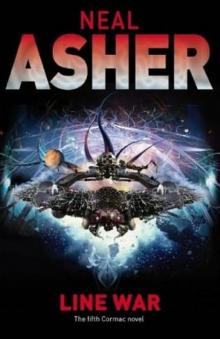 Line War ac-5
Line War ac-5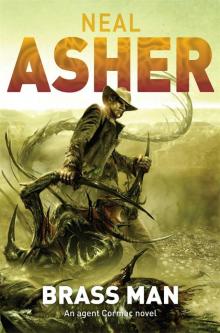 Brass Man
Brass Man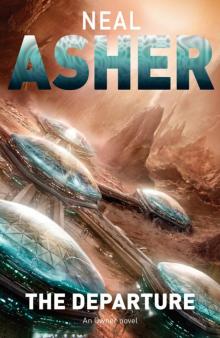 The Departure to-1
The Departure to-1 Cowl
Cowl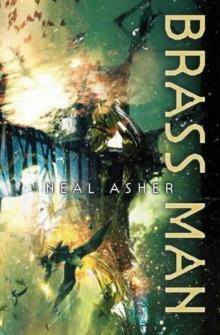 Brass Man ac-3
Brass Man ac-3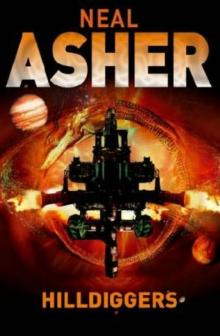 Hilldiggers (polity)
Hilldiggers (polity)![Greg Bear - [Eon Trilogy 1] - Eon (rescan) (v1.0) Read online](http://i1.bookreadfree.com/i2/04/08/greg_bear_-_eon_trilogy_1_-_eon_rescan_v1_0_preview.jpg) Greg Bear - [Eon Trilogy 1] - Eon (rescan) (v1.0)
Greg Bear - [Eon Trilogy 1] - Eon (rescan) (v1.0) The Skinner s-1
The Skinner s-1 The Voyage of the Sable Keech s-2
The Voyage of the Sable Keech s-2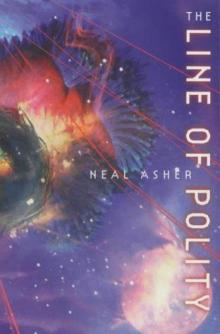 The Line of Polity ac-2
The Line of Polity ac-2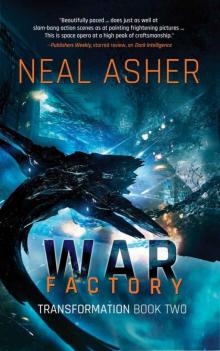 War Factory: Transformations Book Two
War Factory: Transformations Book Two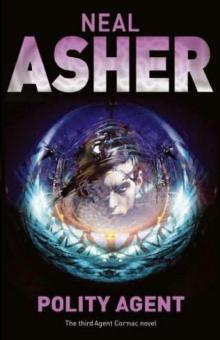 Polity Agent ac-4
Polity Agent ac-4